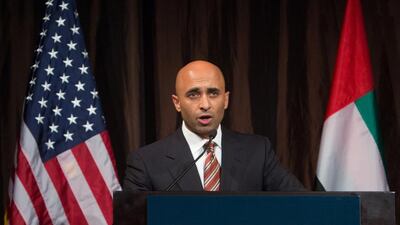NEW YORK // The UAE is “ready to join a coordinated international response” to combat Islamist extremists in Iraq and Syria, the ambassador to Washington has said, signalling that Abu Dhabi is prepared to contribute to international military action against the militants.
Writing in the Wall Street Journal two days before the US secretary of state meets with foreign ministers from the GCC, Jordan and Egypt to convince them to take part in US-led efforts against ISIL, Yousef Al Otaiba also said that a strategy limited to only fighting that group and not Islamist militancy more broadly would ultimately fail.
“The Islamic State may be the most obvious and dominant threat at present, but it is far from the only one,” Mr Al Otaiba wrote. “An international response must confront dangerous Islamist extremists of all stripes across the region”, including Al Qaeda affiliates in Yemen, Libya and Tunisia, Egypt and Syria.
His comments were the UAE’s most detailed public statement addressing Barack Obama’s push for an international and regional coalition to, in the US president’s words, “degrade and ultimately defeat” the insurgent group that has captured large parts of Syria and Iraq.
Mr Obama will deliver a rare prime time address to Americans on Wednesday night laying out a strategy that is the culmination of weeks of deliberations within his administration and with policy experts in Washington and members of Congress from both parties.
ABC News reported on Tuesday that Mr Obama asked the legislators to immediately approve a US military training programme for western- and Arab-backed Syrian rebels. US officials have said the lack of a reliable moderate force is a factor in preventing US airstrikes against ISIL strongholds in Syria, for fear that a power vacuum would be filled by other extremists or the Al Assad regime.
Arabian Gulf countries have long called for increased training for vetted rebels, and Mr Al Otaiba’s comments endorsed strengthening “local forces … that are directly engaging the extremists”, adding that this should be supplemented with “assets like air support, surveillance and special forces”.
The UAE has provided such support in the past through multilateral counterterrorism and peacekeeping missions in Afghanistan, Kosovo and Somalia, he wrote.
Mr Obama and US officials have made clear that the key element of his plan will be the support of regional partners who can, among other things, uniquely provide on-the-ground intelligence and exert pressure and influence on Sunnis in Iraq and Syria to take on ISIL.
To be successful, any US effort against ISIL cannot be seen as a war on Sunnis, and the role of Gulf countries, Jordan and Turkey adds legitimacy.
“For some it will mean contributing to the desperately needed humanitarian relief effort. For some it will mean helping to identify, track, and cut off ISIL’s funding, and prevent the flow of foreign fighters,” the US Secretary of State John Kerry said on Monday.
So far, there have been no commitments made by these US allies, some of whom have competing interests even as they all oppose ISIL, and want to ensure that the US strategy does not strengthen adversaries in the process, analysts said.
Gulf leaders are also still sceptical about Washington’s commitment on a number of fronts, most importantly in Syria, where Mr Obama has backed away from strong action before.
Their level of involvement in the US plan could hinge on Mr Kerry’s meetings with GCC foreign ministers in Jeddah on Thursday.
“They’re waiting to see what Kerry shows up with this week,” said a source in Washington familiar with Gulf deliberations. “It has to be a true partnership.”
The Sunni-led countries will not “go beyond their respective comfort zones in terms of effort and risk unless they are utterly convinced that the United States is orchestrating the overall effort and will do so for the duration”, Frederic C Hof, a senior fellow with the Atlantic Council’s Rafik Hariri Center for the Middle East, wrote on the centre’s website on Tuesday.
But the hurdles to convincing the Arab countries and Turkey will be high, analysts said. They are wary that airstrikes in Syria against ISIL without significant support for Free Syrian Army rebels could strengthen Bashar Al Assad’s regime, and by extension his patron, Iran.
The US has conducted more than 130 airstrikes to support Iraqi forces, Kurdish peshmerga and Sunni tribal fighters battling ISIL in Iraq. But they have also backed up Shia militias and their Iranian battlefield advisers. Gulf countries do not want Shia Islamist forces backed by Tehran to be empowered, which would further alienate Sunni Arab Iraqis.
“I heard someone very important [in the Gulf] asking an American ambassador, ‘why is ISIS a redline but Hizbollah’s intervention in Syria and killing civilians was not? Why was Mosul not a redline but Irbil is a redline?’”, said Mustafa Alani, a senior analyst at the Geneva-based Gulf Research Centre.
As part of the US plan, UAE officials want the US and European countries to more comprehensively shut down financial and “ideological” networks that could fund extremists in Syria and Iraq.
While Qatar and Kuwait were described by a senior US treasury department official earlier this year as “permissive” terrorist funding environments and terror designations against individuals in Kuwait have increased recently, Qatar has proved itself useful to the US, helping free American hostages held by Al Qaeda affiliates and maintaining a close relationship with US intelligence, according to analysts.
“Backing these support networks and organisations is a sophisticated ideological, financial and communications complex that includes countries, charities, companies and individuals,” Mr Al Otaiba wrote.
“It must be choked off through an organised programme of better intelligence, more-aggressive law enforcement and tougher sanctions.”
tkhan@thenational.ae

